牛津译林版英语7B Unit 2 Neighbours Grammar课件(共42张PPT)
文档属性
| 名称 | 牛津译林版英语7B Unit 2 Neighbours Grammar课件(共42张PPT) |  | |
| 格式 | zip | ||
| 文件大小 | 647.2KB | ||
| 资源类型 | 教案 | ||
| 版本资源 | 牛津译林版 | ||
| 科目 | 英语 | ||
| 更新时间 | 2017-03-03 21:20:20 | ||
图片预览

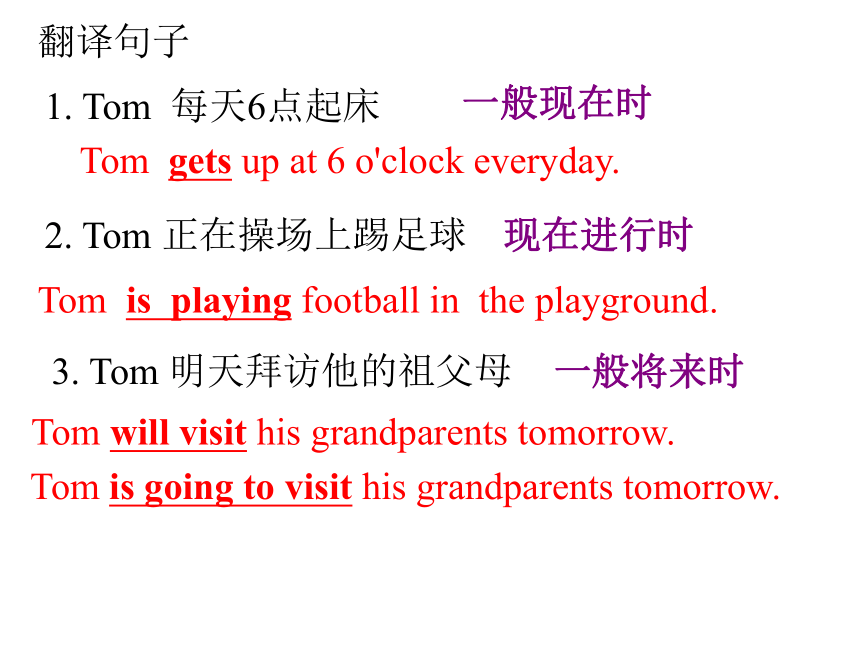
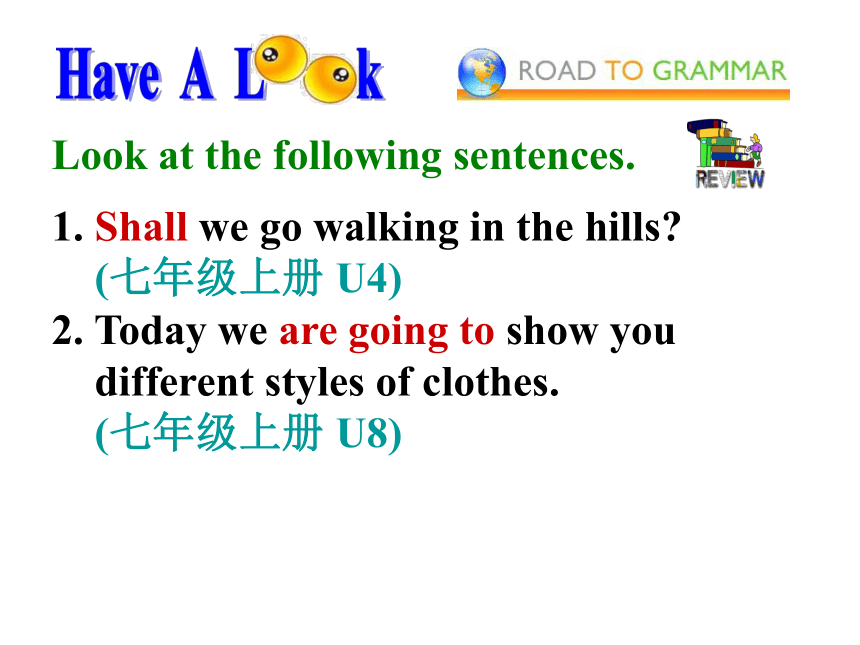
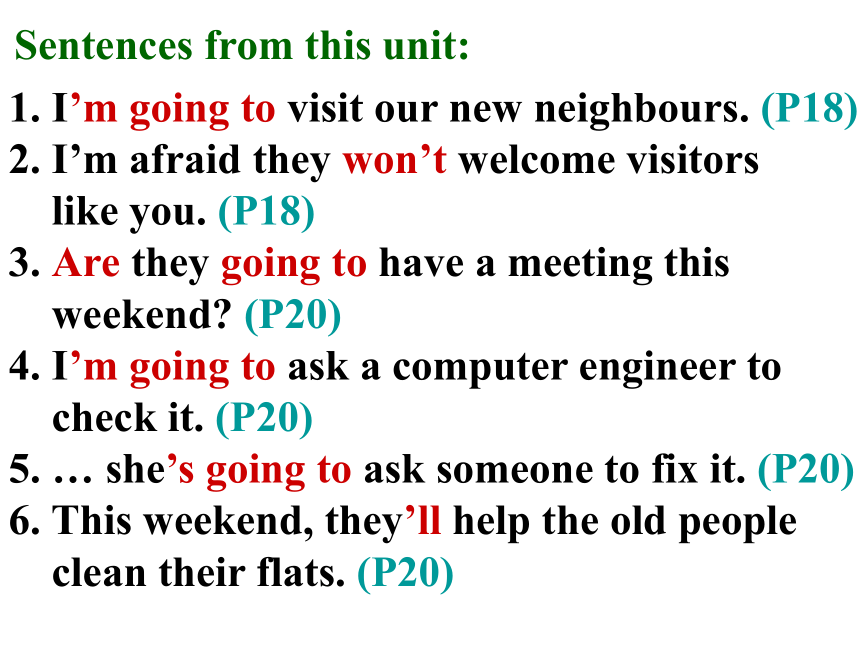
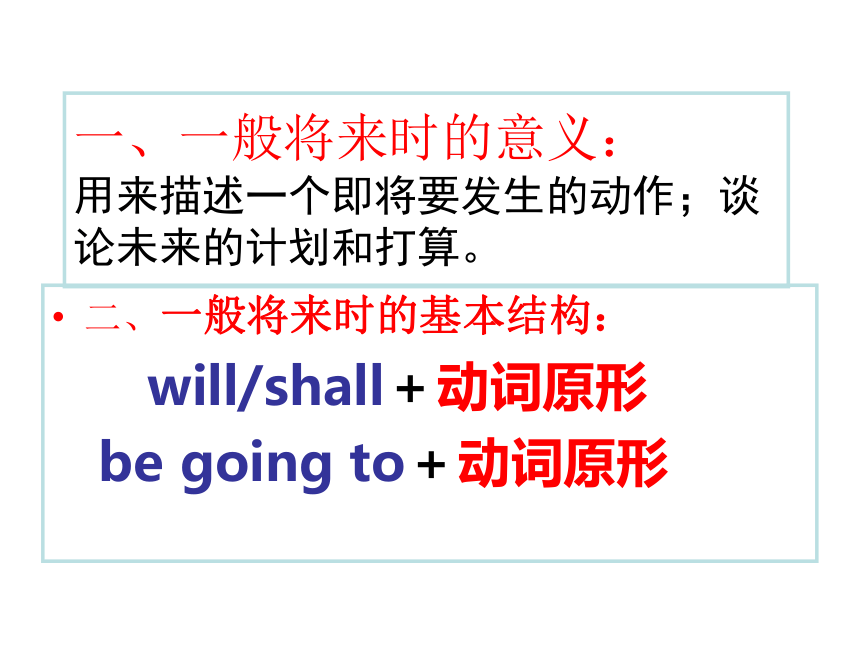
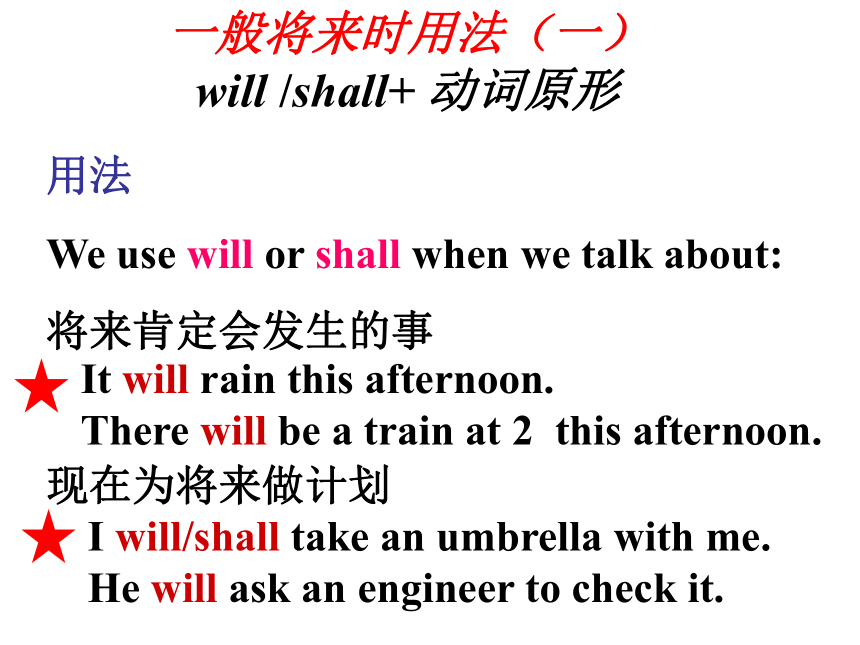

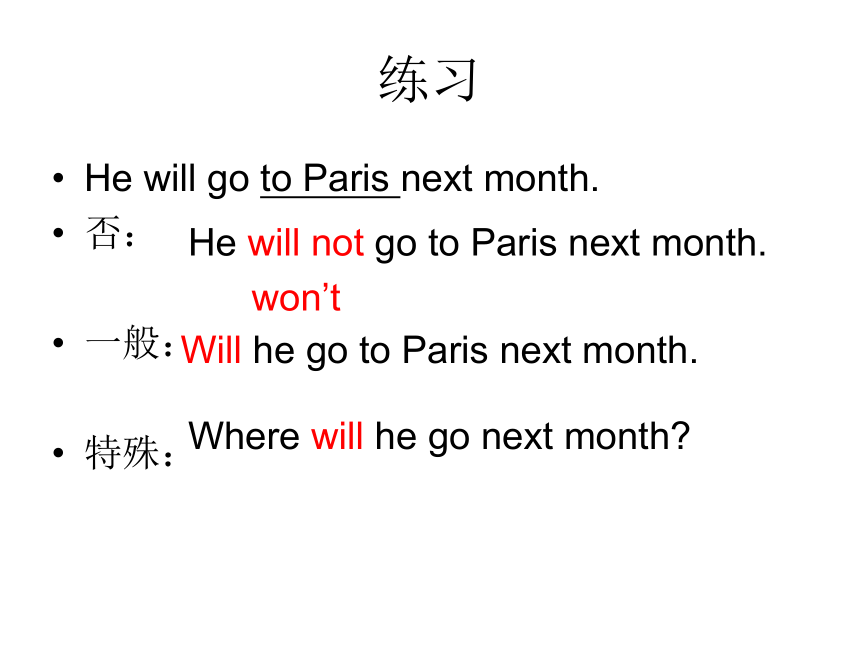
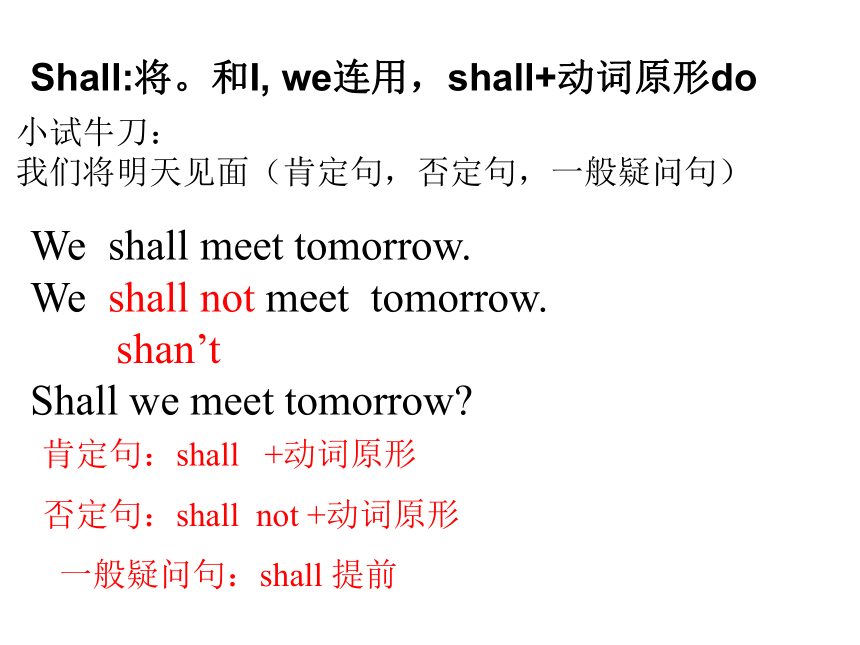

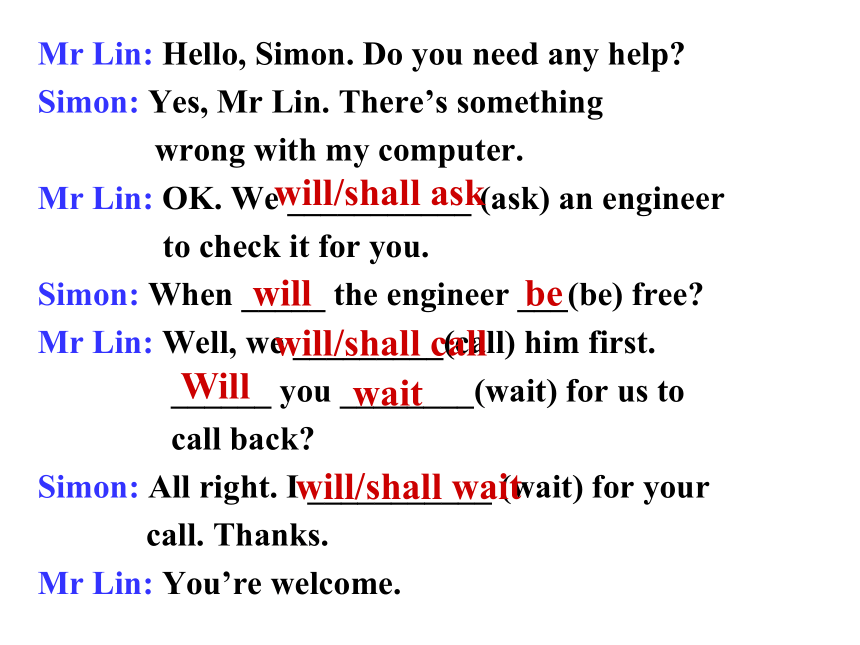
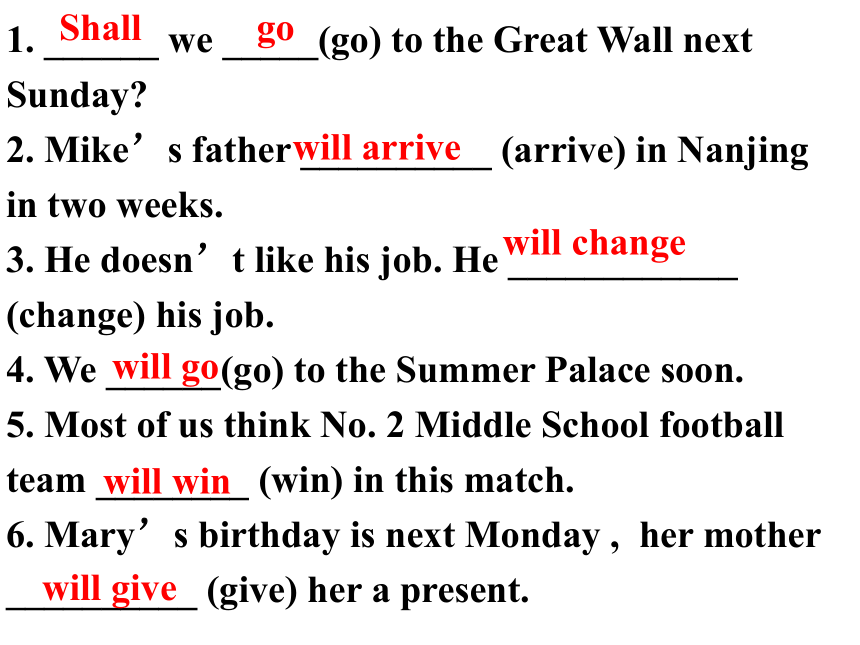
文档简介
课件42张PPT。Unit 2 NeighboursGrammar ( Simple future tense)翻译句子1. Tom 每天6点起床Tom gets up at 6 o'clock everyday.2. Tom 正在操场上踢足球Tom is playing football in the playground.3. Tom 明天拜访他的祖父母Tom will visit his grandparents tomorrow.一般现在时现在进行时一般将来时Tom is going to visit his grandparents tomorrow.Look at the following sentences.1. Shall we go walking in the hills?
(七年级上册 U4)
2. Today we are going to show you
different styles of clothes.
(七年级上册 U8)Sentences from this unit:1. I’m going to visit our new neighbours. (P18)
2. I’m afraid they won’t welcome visitors
like you. (P18)
3. Are they going to have a meeting this
weekend? (P20)
4. I’m going to ask a computer engineer to
check it. (P20)
5. … she’s going to ask someone to fix it. (P20)
6. This weekend, they’ll help the old people
clean their flats. (P20)一、一般将来时的意义: 用来描述一个即将要发生的动作;谈论未来的计划和打算。 二、一般将来时的基本结构:
will/shall+动词原形
be going to+动词原形用法
We use will or shall when we talk about:
将来肯定会发生的事
现在为将来做计划一般将来时用法(一)will /shall+ 动词原形It will rain this afternoon.
There will be a train at 2 this afternoon.I will/shall take an umbrella with me. He will ask an engineer to check it.阅读六个句子,讨论并完成问题2-7
1. She will help the children with their lessons.
2. They will help the old make dumplings.
3. I /we will not tell it to him.
4. Jim won’t go to see a film this afternoon
5.Will he help you? Yes, he will./No, he will not /won’t. 6.Will there be heavy rain tomorrow?
will 引导的一般将来时:表示将来发生的动作或现在制定的计划,最基本的结构:主语+will+动词原形+…
1.肯定:______+_______
2.否定:____________+______
3.一般疑问句:把________提前
肯定回答用______/否定回答用_______ .will not 可缩写成____
思考?will是否随着人称的变化而变化?主语是单数呢? will not/won’twillwilldo(动词原形)dowillwill not/won’twon’t练习He will go to Paris next month.
否:
一般:
特殊:He will not go to Paris next month.
won’tWill he go to Paris next month.
Where will he go next month?
Shall:将。和I, we连用,shall+动词原形do肯定句:shall +动词原形
否定句:shall not +动词原形
一般疑问句:shall 提前小试牛刀:
我们将明天见面(肯定句,否定句,一般疑问句)We shall meet tomorrow.
We shall not meet tomorrow.
shan’t
Shall we meet tomorrow?浏览书上的表格,观察will和shall will和shall的区别will用于一切人称,shall只用于第一人称(I/we)。
但现代英语倾向于所有人称都使用will而不用shall,shall主要出现在非常正式的英语场合中,或用于口语提出请求或征求对方意见。如:
Shall I go home now? (请求)
Shall we see a film? (建议)Mr Lin: Hello, Simon. Do you need any help?
Simon: Yes, Mr Lin. There’s something
wrong with my computer.
Mr Lin: OK. We ___________ (ask) an engineer
to check it for you.
Simon: When _____ the engineer ___(be) free?
Mr Lin: Well, we _________(call) him first.
______ you ________(wait) for us to
call back?
Simon: All right. I ___________ (wait) for your
call. Thanks.
Mr Lin: You’re welcome.will/shall askwill/shall callwillWillwaitwill/shall waitbe1. ______ we _____(go) to the Great Wall next Sunday?
2. Mike’s father __________ (arrive) in Nanjing in two weeks.
3. He doesn’t like his job. He ____________ (change) his job.
4. We ______(go) to the Summer Palace soon.
5. Most of us think No. 2 Middle School football team ________ (win) in this match.
6. Mary’s birthday is next Monday , her mother __________ (give) her a present.
Shall go will arrive will change will go will win will give
我们除了用“will/shall+动词原形”可以表示一般将来时外,我们还可以用“be going to+动词原形”来表示一般将来时. We use be going to when we talk about:
1. 决定、打算将来要做的事
2. 根据某种迹象推断很可能要发生的事一般将来时用法(二)
be going to+动词原形1.我打算去拜访我的新邻居。
I’m going to visit our new neighbours.(计划)It’s so cloudy. I think it’s going to rain.
(根据事实推断极有可能发生)
基本结构:主语+ be(is are) going to +动原否定句和疑问句.1.We are going to have a sports meeting next month.2.Daniel is going to study computer this afternoon.3.They are going to see the film this evening.We aren’t going to have a sports meeting next month.Are you going to have a sports meeting next month?Daniel isn’t going to study computer this afternoon.Is Daniel going to study computer this afternoon?They aren’t going to see the film this evening.Are they going to see the film this evening?What are you going to do next month?What is Daniel going to do this afternoon?be going to各种句式:肯定句:
否定句:
一般疑问句:be going to+V.原形be+not+going to +V.原形将be置于句首 Simon: Hi, Amy.My parents and I are planning a day out with my uncle’s family the day after tomorrow
Amy: What ______ you ____________ (do)
the day after tomorrow ?
Simon: I _________________ (buy) some food.And my cousin Annie
_________________
(buy) some plates and forks.Amy: What _________ your parents
_______________ (do) ?
Simon: They ___________________ (bring) some water.aream going to buygoing to doareis going to buygoing to doare going to bringAmy: How about your uncle?
Simon: He ________________
(make) a fire.Amy: And your aunt? What ____ she
_____________ (do)?
Simon: She _______________ (cook) some food.going to dois going to makeisis going to cookPair work注意11. be going to和will在一般将来时态中一般可以互用,不影响句子的意思。
I am going to carry water.
He is going to make a fire.
They are going to cook.
will/shallwillwillbe going to 和 will 也有区别:
当表示对将来发生某事的客观描述时,一般用will
当表示通过主观推测/猜测,将来可能发生的事,一般
用be going to: The radio says, it ______ rain tomorrow.
Loot at the dark clouds. It ________ rain tomorrow.注意22.There be 结构的一般将来时。
[1]明天下午将有一场服装表演。
There is going to be a fashion show tomorrow.
There will be a fashion show tomorrow.
[2]明天将有两节体育课。
There are going to be two PE lessons tomorrow.
There will be two PE lessons tomorrow.
Pay attention to these!** There be的将来时:There will be …
(2)There is/are going to be …
____ __ _____ ___ ___ a party at
the school hall tomorrow afternoon.在操场上明天将进行一场比赛。明天下午计划在学校礼堂进行一个聚会。ThereisgoingtobeThere will have…
There be going to have…There will____ a match on the playground tomorrow.be“There be”句型一般将来时的否定句和疑问句
1.There will be two suns in the future.
2.There are going to be two football matches tomorrow.
There won’t be two suns in the future.Will there be two suns in the future?
Yes, there will. / No,there won’t.There aren’t going to be two football matches……Are there going to be two football matches……
Yes, there are./ No, there aren’t.tomorrow/ tomorrow morning/afternoon…
the day after tomorrow后天
next Tuesday/ /week/year/month/Sunday..
the coming Sunday /weekend/Tuesday
tonight/this evening /this afternoon今晚/今天下午
in an hour /in five days/in two years
/in 2018 / in the future 在将来
即将到来的…in +一段时间:在一段时间内或在一段时间后soon不久,很快注意3:一般将来时常有时间状语提示有些去向性动词可常用现在进行时来表示将来时,也可用wil+动词原形
go, come, leave离开, start, arrive到达, stay, fly, land着陆, take off起飞
我们明天动身去青岛.
We’re leaving for Qingdao tomorrow.
Look! The bus is coming.
They________(go)to Shanghai
next month.注意4Look! The plane ______(take off).
Don’t worry. The film ______(start) in a few minutes.
Hurry up! The bus ______(leave).
We______(go) to have a picnic this afternoon.There ______ a football game this afternoon.(2012 武汉)
A. will have B. is going to be
C. has D. are going to be
2.My father is in Beijing. He _____ back in three days.(2012 新疆)
A. will come B. comes
C. has come D. came中考链接词形填空Tom and I ____________(see) a play tomorrow.
I______________(watch) TV this evening.
3.__________ He _____________(swim) next week?
4.Lily _____________(not read) books this Sunday.
5.There____________(be) a football match in June.
Will see/are going to seeWill watch/am going to watchWill/ Is swim/ going to swimwon’t read/isn’t going to readWill be/is going to beWhat _____ you __________ (do) after you leave school next year?
2. There ____________ (be) an interesting film in the cinema the day after tomorrow.
3. _____ you ______ (help) us clean the window this afternoon? are going to do is going to beWillhelpAmy will do her homework tonight.
否定句:
一般疑问句:
肯定、否定回答:
对划线部分提问:
Amy won’t do her homework tonight.Will Amy do her homework tonight?Yes, she will.No, she won’t.What will Amy do tonight?对划线部分提问Helen is going to read books
in the library next weekend.
注意点:1. 找到正确的疑问词
2. 加上一般疑问句形式(去掉划线部分内容)
3. 划线部分内容如果是动作的,需用助动词do来代替
1234Helen is going to read books in the library next weekend.Who is going to read books in the library next weekend?Helen is going to read books in the library next weekend.What is Helen going to do in the library next weekend?Helen is going to read books in the library next weekend.Where is Helen going to read books next weekend?Helen is going to read books in the library next weekend.When is Helen going to read books in the library? 用所给动词的适当形式填空
My parents ________(have) a trip to Sunzhou next week.
2. It's so sunny. I don't think it ___________(rain).
3. ----- _______Jim _______(join) in the next basketball match?
---- Of course he is.4. There are too many black clouds in the sky.
I ________(take) my umbrella with me.
5. There __________(be)a volleyball match in our playground this afternoon.
6. They _________ (arrive) home in thirty minutes. 句型转换
1. Justin and Paul will grow some flowers there.(对划线部分提问)
________ will Justin and Paul _______ there?
2. They will take their umbrellas with them tomorrow.(改为否定句)
They _______ ________ take their umbrellas with them tomorrow.
3. The students are swimming in the river now. (用this afternoon替换now)
The students _______ __________ in the river this afternoon.
4. Bill is going to watch TV this afternoon. (改为一般疑问句)
______ Bill _______ to watch TV this afternoon?
单项选择
1. They______ an English evening next Sunday.
are having B. are going to have
C. will having D. is going to have
2. _____ you ______ free next Sunday?
A. Will; are B. Will; be C. Do; be D. Are; be
3. He_______ there at ten tomorrow morning.
A. will B. is C. will be D. be
4. _______ your brother ____ a maganize from the library?
A. Are; going to borrow B. Is; going to borrow
C. Will; borrows D. Are; going to borrows 5. ----- Shall I come again tomorrow afternoon? -----________.
A. Yes, please B. Yes, you will
C. No, Please D. No, you won't
6. It ________ the year of the horse next year.
A. is going to be B. is going to C. will be D. will is
7. ---- Let's go out to play football, shall we?
----OK. I _______.
A. will coming B. be going to come
C. come D. am coming
8. It _______ us a long time to learn English well.
A. takes B. cost C. spends D. will spend
9. It's very dark and cold. It _______rain.
A. will B. shall C. is going to D. are going to
10.Jack, with his friends, _______ see Mr Li tomorrow.
A. is going to B. are going to C. go to D. will goes
11. It _______ my brother’s birthday tomorrow. He _______ a party.
A. is going to be; will have B. will be; is having
C. will be; is going to have D. will have; is going to be
12. Li Ming is 10 years old now, next year he _______11.
A. is B. is going to be C. will be D. will to be 试翻译以下句子:1、明天他将教我英语。
2、他们下个星期带我们去公园。
3、西蒙十分钟后将干什么?他将帮助妈 妈打扫房间。 He’ll teach me English tomorrow.They will take us to the park
next week.What is Simon going to do in ten minutes?
He’s going to help his mother clean the room..
(七年级上册 U4)
2. Today we are going to show you
different styles of clothes.
(七年级上册 U8)Sentences from this unit:1. I’m going to visit our new neighbours. (P18)
2. I’m afraid they won’t welcome visitors
like you. (P18)
3. Are they going to have a meeting this
weekend? (P20)
4. I’m going to ask a computer engineer to
check it. (P20)
5. … she’s going to ask someone to fix it. (P20)
6. This weekend, they’ll help the old people
clean their flats. (P20)一、一般将来时的意义: 用来描述一个即将要发生的动作;谈论未来的计划和打算。 二、一般将来时的基本结构:
will/shall+动词原形
be going to+动词原形用法
We use will or shall when we talk about:
将来肯定会发生的事
现在为将来做计划一般将来时用法(一)will /shall+ 动词原形It will rain this afternoon.
There will be a train at 2 this afternoon.I will/shall take an umbrella with me. He will ask an engineer to check it.阅读六个句子,讨论并完成问题2-7
1. She will help the children with their lessons.
2. They will help the old make dumplings.
3. I /we will not tell it to him.
4. Jim won’t go to see a film this afternoon
5.Will he help you? Yes, he will./No, he will not /won’t. 6.Will there be heavy rain tomorrow?
will 引导的一般将来时:表示将来发生的动作或现在制定的计划,最基本的结构:主语+will+动词原形+…
1.肯定:______+_______
2.否定:____________+______
3.一般疑问句:把________提前
肯定回答用______/否定回答用_______ .will not 可缩写成____
思考?will是否随着人称的变化而变化?主语是单数呢? will not/won’twillwilldo(动词原形)dowillwill not/won’twon’t练习He will go to Paris next month.
否:
一般:
特殊:He will not go to Paris next month.
won’tWill he go to Paris next month.
Where will he go next month?
Shall:将。和I, we连用,shall+动词原形do肯定句:shall +动词原形
否定句:shall not +动词原形
一般疑问句:shall 提前小试牛刀:
我们将明天见面(肯定句,否定句,一般疑问句)We shall meet tomorrow.
We shall not meet tomorrow.
shan’t
Shall we meet tomorrow?浏览书上的表格,观察will和shall will和shall的区别will用于一切人称,shall只用于第一人称(I/we)。
但现代英语倾向于所有人称都使用will而不用shall,shall主要出现在非常正式的英语场合中,或用于口语提出请求或征求对方意见。如:
Shall I go home now? (请求)
Shall we see a film? (建议)Mr Lin: Hello, Simon. Do you need any help?
Simon: Yes, Mr Lin. There’s something
wrong with my computer.
Mr Lin: OK. We ___________ (ask) an engineer
to check it for you.
Simon: When _____ the engineer ___(be) free?
Mr Lin: Well, we _________(call) him first.
______ you ________(wait) for us to
call back?
Simon: All right. I ___________ (wait) for your
call. Thanks.
Mr Lin: You’re welcome.will/shall askwill/shall callwillWillwaitwill/shall waitbe1. ______ we _____(go) to the Great Wall next Sunday?
2. Mike’s father __________ (arrive) in Nanjing in two weeks.
3. He doesn’t like his job. He ____________ (change) his job.
4. We ______(go) to the Summer Palace soon.
5. Most of us think No. 2 Middle School football team ________ (win) in this match.
6. Mary’s birthday is next Monday , her mother __________ (give) her a present.
Shall go will arrive will change will go will win will give
我们除了用“will/shall+动词原形”可以表示一般将来时外,我们还可以用“be going to+动词原形”来表示一般将来时. We use be going to when we talk about:
1. 决定、打算将来要做的事
2. 根据某种迹象推断很可能要发生的事一般将来时用法(二)
be going to+动词原形1.我打算去拜访我的新邻居。
I’m going to visit our new neighbours.(计划)It’s so cloudy. I think it’s going to rain.
(根据事实推断极有可能发生)
基本结构:主语+ be(is are) going to +动原否定句和疑问句.1.We are going to have a sports meeting next month.2.Daniel is going to study computer this afternoon.3.They are going to see the film this evening.We aren’t going to have a sports meeting next month.Are you going to have a sports meeting next month?Daniel isn’t going to study computer this afternoon.Is Daniel going to study computer this afternoon?They aren’t going to see the film this evening.Are they going to see the film this evening?What are you going to do next month?What is Daniel going to do this afternoon?be going to各种句式:肯定句:
否定句:
一般疑问句:be going to+V.原形be+not+going to +V.原形将be置于句首 Simon: Hi, Amy.My parents and I are planning a day out with my uncle’s family the day after tomorrow
Amy: What ______ you ____________ (do)
the day after tomorrow ?
Simon: I _________________ (buy) some food.And my cousin Annie
_________________
(buy) some plates and forks.Amy: What _________ your parents
_______________ (do) ?
Simon: They ___________________ (bring) some water.aream going to buygoing to doareis going to buygoing to doare going to bringAmy: How about your uncle?
Simon: He ________________
(make) a fire.Amy: And your aunt? What ____ she
_____________ (do)?
Simon: She _______________ (cook) some food.going to dois going to makeisis going to cookPair work注意11. be going to和will在一般将来时态中一般可以互用,不影响句子的意思。
I am going to carry water.
He is going to make a fire.
They are going to cook.
will/shallwillwillbe going to 和 will 也有区别:
当表示对将来发生某事的客观描述时,一般用will
当表示通过主观推测/猜测,将来可能发生的事,一般
用be going to: The radio says, it ______ rain tomorrow.
Loot at the dark clouds. It ________ rain tomorrow.注意22.There be 结构的一般将来时。
[1]明天下午将有一场服装表演。
There is going to be a fashion show tomorrow.
There will be a fashion show tomorrow.
[2]明天将有两节体育课。
There are going to be two PE lessons tomorrow.
There will be two PE lessons tomorrow.
Pay attention to these!** There be的将来时:There will be …
(2)There is/are going to be …
____ __ _____ ___ ___ a party at
the school hall tomorrow afternoon.在操场上明天将进行一场比赛。明天下午计划在学校礼堂进行一个聚会。ThereisgoingtobeThere will have…
There be going to have…There will____ a match on the playground tomorrow.be“There be”句型一般将来时的否定句和疑问句
1.There will be two suns in the future.
2.There are going to be two football matches tomorrow.
There won’t be two suns in the future.Will there be two suns in the future?
Yes, there will. / No,there won’t.There aren’t going to be two football matches……Are there going to be two football matches……
Yes, there are./ No, there aren’t.tomorrow/ tomorrow morning/afternoon…
the day after tomorrow后天
next Tuesday/ /week/year/month/Sunday..
the coming Sunday /weekend/Tuesday
tonight/this evening /this afternoon今晚/今天下午
in an hour /in five days/in two years
/in 2018 / in the future 在将来
即将到来的…in +一段时间:在一段时间内或在一段时间后soon不久,很快注意3:一般将来时常有时间状语提示有些去向性动词可常用现在进行时来表示将来时,也可用wil+动词原形
go, come, leave离开, start, arrive到达, stay, fly, land着陆, take off起飞
我们明天动身去青岛.
We’re leaving for Qingdao tomorrow.
Look! The bus is coming.
They________(go)to Shanghai
next month.注意4Look! The plane ______(take off).
Don’t worry. The film ______(start) in a few minutes.
Hurry up! The bus ______(leave).
We______(go) to have a picnic this afternoon.There ______ a football game this afternoon.(2012 武汉)
A. will have B. is going to be
C. has D. are going to be
2.My father is in Beijing. He _____ back in three days.(2012 新疆)
A. will come B. comes
C. has come D. came中考链接词形填空Tom and I ____________(see) a play tomorrow.
I______________(watch) TV this evening.
3.__________ He _____________(swim) next week?
4.Lily _____________(not read) books this Sunday.
5.There____________(be) a football match in June.
Will see/are going to seeWill watch/am going to watchWill/ Is swim/ going to swimwon’t read/isn’t going to readWill be/is going to beWhat _____ you __________ (do) after you leave school next year?
2. There ____________ (be) an interesting film in the cinema the day after tomorrow.
3. _____ you ______ (help) us clean the window this afternoon? are going to do is going to beWillhelpAmy will do her homework tonight.
否定句:
一般疑问句:
肯定、否定回答:
对划线部分提问:
Amy won’t do her homework tonight.Will Amy do her homework tonight?Yes, she will.No, she won’t.What will Amy do tonight?对划线部分提问Helen is going to read books
in the library next weekend.
注意点:1. 找到正确的疑问词
2. 加上一般疑问句形式(去掉划线部分内容)
3. 划线部分内容如果是动作的,需用助动词do来代替
1234Helen is going to read books in the library next weekend.Who is going to read books in the library next weekend?Helen is going to read books in the library next weekend.What is Helen going to do in the library next weekend?Helen is going to read books in the library next weekend.Where is Helen going to read books next weekend?Helen is going to read books in the library next weekend.When is Helen going to read books in the library? 用所给动词的适当形式填空
My parents ________(have) a trip to Sunzhou next week.
2. It's so sunny. I don't think it ___________(rain).
3. ----- _______Jim _______(join) in the next basketball match?
---- Of course he is.4. There are too many black clouds in the sky.
I ________(take) my umbrella with me.
5. There __________(be)a volleyball match in our playground this afternoon.
6. They _________ (arrive) home in thirty minutes. 句型转换
1. Justin and Paul will grow some flowers there.(对划线部分提问)
________ will Justin and Paul _______ there?
2. They will take their umbrellas with them tomorrow.(改为否定句)
They _______ ________ take their umbrellas with them tomorrow.
3. The students are swimming in the river now. (用this afternoon替换now)
The students _______ __________ in the river this afternoon.
4. Bill is going to watch TV this afternoon. (改为一般疑问句)
______ Bill _______ to watch TV this afternoon?
单项选择
1. They______ an English evening next Sunday.
are having B. are going to have
C. will having D. is going to have
2. _____ you ______ free next Sunday?
A. Will; are B. Will; be C. Do; be D. Are; be
3. He_______ there at ten tomorrow morning.
A. will B. is C. will be D. be
4. _______ your brother ____ a maganize from the library?
A. Are; going to borrow B. Is; going to borrow
C. Will; borrows D. Are; going to borrows 5. ----- Shall I come again tomorrow afternoon? -----________.
A. Yes, please B. Yes, you will
C. No, Please D. No, you won't
6. It ________ the year of the horse next year.
A. is going to be B. is going to C. will be D. will is
7. ---- Let's go out to play football, shall we?
----OK. I _______.
A. will coming B. be going to come
C. come D. am coming
8. It _______ us a long time to learn English well.
A. takes B. cost C. spends D. will spend
9. It's very dark and cold. It _______rain.
A. will B. shall C. is going to D. are going to
10.Jack, with his friends, _______ see Mr Li tomorrow.
A. is going to B. are going to C. go to D. will goes
11. It _______ my brother’s birthday tomorrow. He _______ a party.
A. is going to be; will have B. will be; is having
C. will be; is going to have D. will have; is going to be
12. Li Ming is 10 years old now, next year he _______11.
A. is B. is going to be C. will be D. will to be 试翻译以下句子:1、明天他将教我英语。
2、他们下个星期带我们去公园。
3、西蒙十分钟后将干什么?他将帮助妈 妈打扫房间。 He’ll teach me English tomorrow.They will take us to the park
next week.What is Simon going to do in ten minutes?
He’s going to help his mother clean the room..
